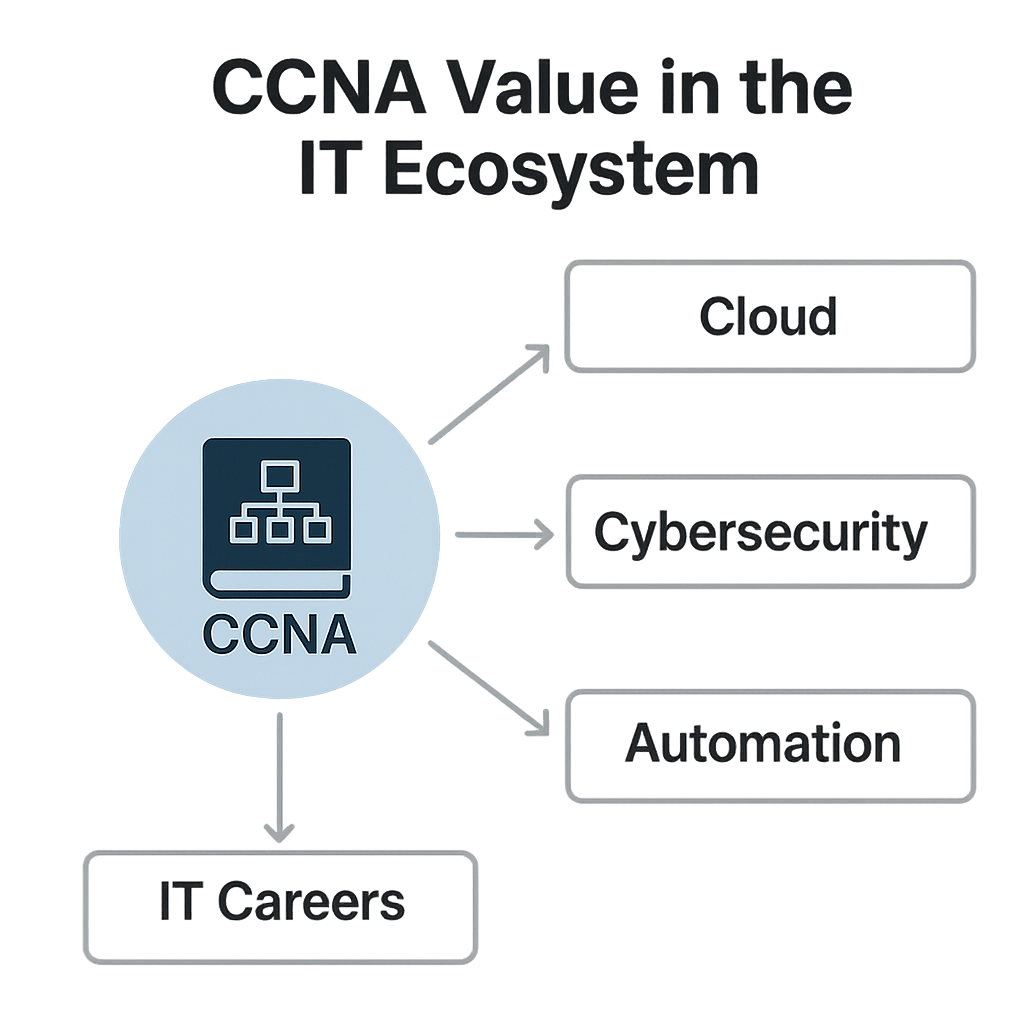Is the CCNA Still Worth It in Today’s IT Industry?
As a professor teaching CMIT 351 (Switching, Routing, and Wireless Essentials) at the University of Maryland Global Campus (UMGC), I often get asked by students whether pursuing the Cisco Certified Network Associate (CCNA) is still worth it. CMIT 351 is designed as a preparatory course for the CCNA, so this question naturally arises as learners weigh the time, cost, and effort involved. The CCNA was once regarded as one of the most respected certifications in IT networking, but with rapid changes in technology, cloud adoption, and automation, it is fair to ask: does it still hold the same value today?
The Value of Certifications in General
Certifications remain important across the IT industry. According to Pearson VUE’s 2025 Value of IT Certification report, 82% of candidates said certification gave them confidence to pursue new opportunities, while 63% reported receiving or expecting a promotion, and 32% noted salary increases (Pearson VUE, 2025). Employers also emphasized that certified employees were more productive and innovative. Similarly, a CompTIA survey found that 83% of students believed certifications validated their skills and kept them relevant, while 81% saw them as stepping stones to career advancement (CompTIA, 2025).
CCNA’s Specific Role
The CCNA still provides a strong foundation in networking fundamentals such as routing, switching, IP addressing, and VLANs. Employers often include it as a requirement or preference for entry- to mid-level roles like Network Engineer or Administrator (Glassdoor, 2025; Indeed, 2025). On LinkedIn, thousands of job postings mention CCNA, showing it continues to hold weight in the marketplace (LinkedIn, 2025).
Compensation data also supports its value. CCNA-certified professionals in the United States earn an average of $75,000–$87,000 annually, depending on role and region (InfoSec Institute, 2025). For many organizations, the CCNA still represents proof of networking competence, particularly in Cisco-centric environments.
The Changing Landscape
However, CCNA does not carry the same prestige it did 10–15 years ago. Modern networks often span multiple vendors, cloud platforms, and software-defined solutions. Job postings increasingly combine CCNA expectations with cloud or automation skills. For example, roles such as “Network Engineer – Azure/Hybrid” may list CCNA as required but also demand knowledge of cloud networking (Irvine Technology Corporation, 2025).
This highlights an important point: while CCNA remains relevant, it is rarely sufficient on its own. To stay competitive, professionals need to combine networking fundamentals with cloud, security, or automation expertise.
CCNA as a Stepping Stone
One of the CCNA’s greatest strengths is its versatility. While it prepares students for traditional networking roles, its knowledge base translates into other IT domains as well. For instance, cybersecurity heavily depends on networking fundamentals, making CCNA an excellent foundation for security analysts and engineers. In cloud and hybrid infrastructure, CCNA knowledge helps professionals design and troubleshoot virtual networks in platforms like AWS or Azure.
Beyond these broad areas, CCNA can serve as the first step toward more specialized paths. Learners interested in advanced networking often progress to CCNP Enterprise, while others may choose to specialize in wireless networking, collaboration technologies (VoIP), or data center infrastructure. In this sense, CCNA is not just a certification—it is a gateway into a wide spectrum of IT careers, both broad and highly specific.
Conclusion
So, is the CCNA still worth it? The answer is yes—but with nuance. For students beginning their IT careers, like those in CMIT 351, CCNA provides a strong foundation and a recognized credential that can open doors to networking roles. For working professionals, it remains valuable, but it should be paired with modern certifications and skills in cloud, security, or automation to stay competitive. In a world where networks are increasingly hybrid and software-driven, CCNA is best viewed as a stepping stone—one that must be built upon for long-term success.
References
CompTIA. (2025, March 26). Students say industry-recognized certifications provide value. Community College Daily. https://www.ccdaily.com/2025/03/students-say-industry-recognized-certifications-provide-value/
Glassdoor. (2025). Network engineer CCNA jobs. https://www.glassdoor.com/Job/us-network-engineer-ccna-jobs-SRCH_IL.0%2C2_IN1_KO3%2C24.htm
Indeed. (2025). CCNA jobs. https://www.indeed.com/q-ccna-jobs.html
InfoSec Institute. (2025). The job outlook for CCNA professionals. https://www.infosecinstitute.com/resources/ccna/the-job-outlook-for-ccna-professionals/
Irvine Technology Corporation. (2025). Network engineer – Azure / Hybrid. https://www.irvinetechcorp.com/job/22836-network-engineer-azure-hybrid-phoenix-arizona/
LinkedIn. (2025). CCNA jobs in the United States. https://www.linkedin.com/jobs/ccna-jobs
Pearson VUE. (2025). The value of IT certification candidate report. https://go.pearsonvue.com/voc


